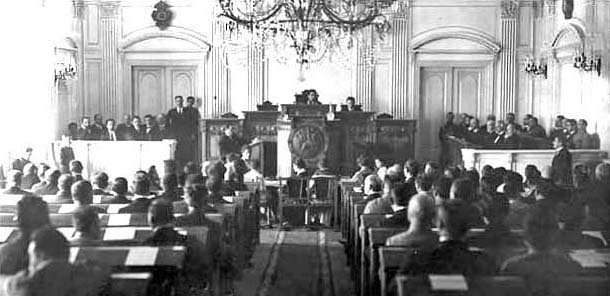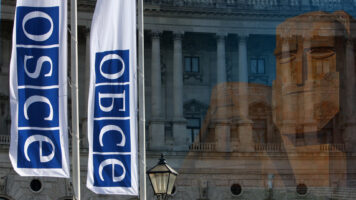The political situation on the eve of the signing of the Treaty of Batum
06.06
2025
Part 2
On May 25, 1918, the leader of the Transcaucasian delegation negotiating with Turkey in Batumi, A. Chkhenkeli, received a message from Tiflis indicating that the issue of Georgia’s independence would be discussed in Selim on May 26. On the same day, the chairman of the Georgian National Council, N. Zhordania, also shared this news with the Armenian delegation in Batumi, led by Alexander Khatisian. The news caused significant concern among the Armenians. At that time, the political landscape in the South Caucasus was as follows:
- After the Turkish capture of Batumi on May 14, 1918, Armenians considered forming a united front with the Georgians, but following Georgia’s declaration of independence, this became impossible. Since mid-May 1918, Germany had already taken serious practical steps to protect Georgia from Turkish military actions.
- It was pointless to discuss the stance of the Tatars, as they not only supported the Turks to seize control of Transcaucasia but also envisioned their future as part of a single state with the Turks (similar to the current embryonic trends).
- Under these circumstances, Armenians remained completely isolated from neighbors and stood alone against Turkey.
- There was no hope to rely on Russia either, as Russia, engaged in a civil war, had no influence in Transcaucasia.
Theoretically, no action is free of flaws, but critics of the Treaty of Batum generally avoid objectively analyzing or presenting the situation prevailing before the treaty was signed and the path that the signatories should have taken. Indeed, the pre-treaty situation was extremely tense.
What were the issues? To avoid negotiations alone with the Turks, find a political “sponsor,” and act quickly.
On the very same day—May 25, before Georgia declared independence—Alexander Khatisian and Hovhannes Kajaznuni met in the Minna-Khorn ship with the head of the German delegation, Von Lossow, who was rushing to Poti to sign the secret Georgian-German agreement on May 28. The Armenian delegation asked von Lossow to mediate with the German government to accept Armenia’s protectorate following Georgia’s example, but von Lossow only offered the following advice:
- Send a delegation to Berlin to protest against Turkey’s violation of the March 3, 1918 Brest-Litovsk treaty.
- Declare Armenia an independent state, excluding military conflict with Turkey.
- Sign a peace treaty simultaneously with Turkey and other members of the Quadruple Alliance.
The Armenian delegates immediately informed the Armenian National Central Council in Tiflis and the ARF (Dashnaktsutyun). It was noted that Germany was not economically interested in Armenia and did not favor worsening relations with Turkey because of Armenia.
Without the promise of German protection, Armenians found themselves alone against the Turks and had to take steps to establish relations. On May 26, in Batumi, M. Papajanyan met with the head of the Turkish delegation, Khalil Bey. He announced that he was going to present an ultimatum to the Transcaucasian government, and in case of its dissolution, to the national councils of Armenians, Georgians and Tatars, waiting 72 hours. Khalil Bey also clearly stated: “If the Armenians wish to accept the Turkish ultimatum, we will not oppose it, provided they build a separate state on their 10,000 square versts, which we will recognize and sign a peace treaty with. We will also not oppose if the Armenians want to establish a confederation with Muslims.”
Indeed, Khalil Bey presented the ultimatum to the Transcaucasian government on the same day, but by then Georgia had declared independence. In this new political context, Khalil Bey declared that the issue was still unresolved and handed the ultimatum to members of the Armenian, Georgian, and Tatar delegations, demanding they fully accept or reject the Turkish demands within 72 hours with new border changes.
The Armenian members of the Batumi negotiations were familiar with the contents of the Turkish proposals from the first days of negotiations, starting May 11. The Turks presented the final ultimatum on May 26, demanding extensive territories from the Georgians, who were outside the Treaty of Brest-Litovsk—including Tiflis and Kutaisi provinces—and from the Armenians the entire province of Alexandrapol, most of the provinces of Yerevan and Etchmiadzin, including the city of Etchmiadzin, as well as almost the entire Shirak and Ararat valleys, depriving the Armenians of the most vital territories. The chosen day, May 26, was also not accidental, because the heroic battles had not yet ended.
Why did the Turks accept Armenian demands and recognize the independence of Armenia when the heroic battles were still under way? On May 27, at the invitation of Khalil Bey and Wehib Pasha, a meeting took place in Batumi between Alexander Khatisian and Hovhannes Kajaznuni, and the day before with M. Papajanyan. It’s important to note that before the Heroic Battles of May, the Turks spoke to the Armenian delegation in the language of ultimatum, were unfriendly and clearly hostile, but after the battles, their attitude changed to one of “friendliness.” They increasingly talked about not opposing the creation of an Armenian state in the Caucasus, which they had hinted at during the Trebizond negotiations. The situation had become very tense and complicated: on the one hand, the disintegration of Transcaucasia prompted the question of establishing an independent Armenian state; on the other hand, without military and political guarantees from Turkey, the situation was fraught with unpredictable consequences, including the physical extermination of Eastern Armenians, as happened with Western Armenians.
The declaration of Armenia’s independence was now a fact, and Alexander Khatisian and Hovhannes Kajaznuni returned to Tiflis on May 28 to report to the Armenian National Central Council. That same evening, the council held a meeting with conflicting opinions, but ultimately decided to respond to the Turkish ultimatum with the following demands:
- Keep Etchmiadzin within the borders of the Armenian Republic,
- Do not subject Armenians in the occupied territories to military conscription,
- The Armenian Republic must have 1,500 soldiers for internal order and border defense,
- Refugee Armenians must return to their settlements.
In other words, despite these heavy conditions, Armenians did not fully accept the ultimatum and came up with moderate proposals (not like now). The meeting decided to send to Batumi a delegation with broad authority—comprising Alexander Khatisian (chairman), Hovhannes Kajaznuni, and M. Papajanyan. The next day, a telegram was sent to Khalil Bey, informing him that the Armenian National Council’s mediating delegation had already left for Batumi. On May 30, the statement of the Armenian National Central Council was published, by which the Armenian National Council declared itself the supreme and sole authority of the Armenian provinces.





